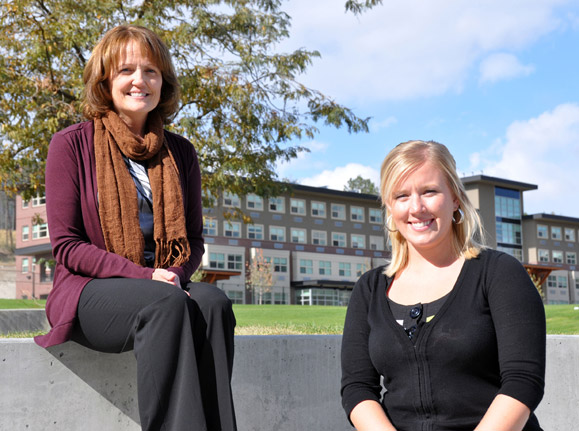
UBC Okanagan social work graduate students Anne Stack and Erin Ptolemy have each received major fellowship awards recognizing their research work in health care.
Two Master of Social Work students have received IMPART (Intersections of Mental Health Perspectives in Addictions Research Training) fellowships for their research work in health care.
IMPART is a research training program funded by the Canadian Institutes for Health Research (CIHR). The award is given to highly qualified individuals pursuing a career in addictions research with a particular focus on gender, women and addictions.
Anne Stack, who will be starting her PhD in Interdisciplinary Graduate Studies in January, was awarded an IMPART fellowship (doctoral level) of $21,000 per year, available for a maximum of four years, to support a project that explores and analyzes the ways in which interlocking systems of care interface with mothers with mental illness who use substances, such as illegal drugs, or misuse pharmaceuticals or alcohol.
“Prevalence rates indicate that a woman with a diagnosis of mental illness is slightly more likely to become a parent than a woman with no history of mental illness, but very often mothers with mental illness don’t get the types of help and support that they need,” says Stack. “My proposed study will include an examination of the organizational coordination of these systems of care. These types of studies are aimed at improving services for mothers with mental illness.”
Student researcher Erin Ptolemy was awarded an IMPART fellowship (masters level) of $18,000 per year for up to two years, in support of her master’s thesis Tobacco exposure and breast cancer: Perspectives of young women.
“Recently, an expert panel of Canadian researchers concluded that there is a causal link between active smoking and second-hand smoke exposure and premenopausal breast cancer. There are very few public health and message campaigns addressing this risk factor,” says Ptolemy.
“I am analyzing data from an online survey examining young women’s knowledge of, interest in, and perceived importance of information about tobacco exposure as a risk factor for breast cancer,” she says. “Survey findings will provide guidance in developing tailored health messages and other interventions about this modifiable breast cancer risk factor.”
Ptolemy also recently received the prestigious Psychosocial Oncology Research Training (PORT) fellowship, a transdisciplinary graduate research initiative also funded by the CIHR. PORT provides financial support to masters, doctoral and post-doctoral students from a variety of health, social, organizational and technological sciences that share interests related to oncology, a branch of medicine dealing with tumours and cancer.
— 30 —